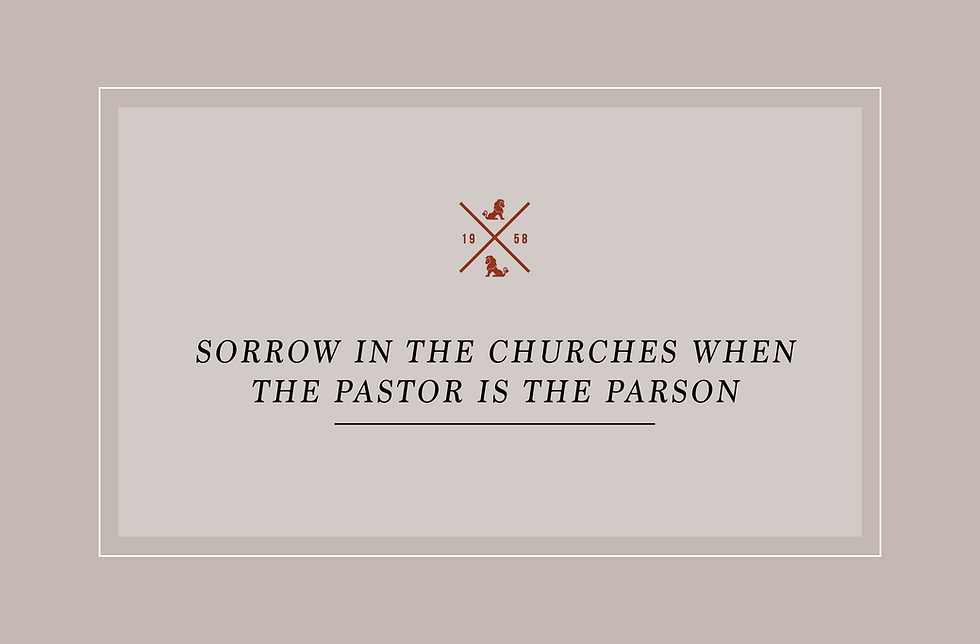Sorrow in the Churches When the Pastor Is the Parson
- Paige Patterson

- Apr 22, 2021
- 3 min read

Geoffrey Chaucer’s intimate assessment of the souls of assorted pilgrims journeying together to Canterbury in the spring of the year stirs motives ill and noble of these transients is apparent to any reader. Most characters display a dark side as well as certain noble hallmarks. The most intriguing exception to this occurs at the end of the tale, when the parson presents his short tale, in which Chaucer seems to append no derogatory notations and, in fact, concludes with something of his own confession.
The identification of the pastor as the parson (or the person) set him aside as distinct from most other companions on the pilgrimage and from most in the community. The expectation that the Protestant pastor would be a man of sterling character upholding in his person the morality of Jesus and the apostles and speaking the comfort of the Word of God is not surprising. Despite failures that occurred in Chaucer’s day (d.1400), the legendary righteousness of the pastor was unabated until almost the dawning of the twenty-first century. However, perhaps this high celebration of the pastor’s character may have proven less than helpful. When the pastor became the parson rather than the shepherd, maybe the elevated perspective of the community was unintentionally harmful.
Mind you, there is no lack of demand placed on the pastor in Holy Scripture. 1 Timothy 3:1-7; Titus 1:5-9; and 1 Peter 5:1-4 reiterate the lofty standards expected of the pastor of the Lord’s churches. Words like blameless, sober-minded, gentle, and one who rules his own house well all grace the anticipated resume of the man who should be the shepherd of the flock. Not that there were no failures. Paul had a major disappointment with Demas, and for a while John Mark was in the shadows. Even our Lord had to deal with the treachery of Judas.
But the general picture of the preacher across the ages has been of nobility and faithfulness to the Lord. Stories like that of Robert Murray M’Cheyne of the Church of Scotland are the remarkable legends of which preacher-craft is made. Born in 1813 in Edinburgh, he died in 1843 at only thirty years of age. As pastor of St. Peters in Dundee, he distinguished himself for personal holiness, preaching, and as a personal evangelist, leading men to Christ regularly. His literary work is read today by aspiring ministers who care that their lives will testify more profoundly than their mouths.
Two critical steps need to characterize the churches of these last days. Were renewal to develop, you may rest assured that these two agendas will rank high in the churches. Calling attention to the whiteness of the harvest, our Lord said, “Pray the Lord of the harvest will send forth laborers into his harvest” (Matthew 9:38). Paul asked the question in memorable form in Romans 10:14-15, saying, “How shall they hear without a preacher? And how shall they preach unless they are sent? As it is written: How beautiful are the feet of those who preach the gospel of peace….” Pastors and other harvesters are sent by God, or they will not harvest! And harvesters arise when the church grows sufficiently concerned to beg God to send the harvesters.
Accompanying the church’s prayer that God would send forth reapers into whitened fields will be a decision on the part of a pastor once again to be the parson. In the community he will become the person whose personal standard of righteousness will distinguish him from all others. He will once again emerge as the light-giver in each community, flooding the darkness with the illuminating rays of God’s Word. While he may be hated and even attacked by some who reject the standards of the Almighty, even in that, he will be the person who stands in the breach and enunciates the Word of the Lord. He will be known for his diligence in searching the mind of the Lord as revealed in the Scriptures.
So what is your first thought when someone mentions the pastor? An adroit rhetorician? A clever interpreter of the morning news cycle? An architectural genius? An administrative whiz? An accomplished theological debater? Those may be fine qualities, and each may be value added to his giftedness. But today’s necessity is for a generation of men who feature a heart for God. God’s rejection of Saul in 1 Samuel 13:14 was not because he had no kingly attributes, but God was seeking a man who had a heart for God, whose first concern was to find and honor God’s will. And that, friends, is the primary need of the church this hour.





Comments